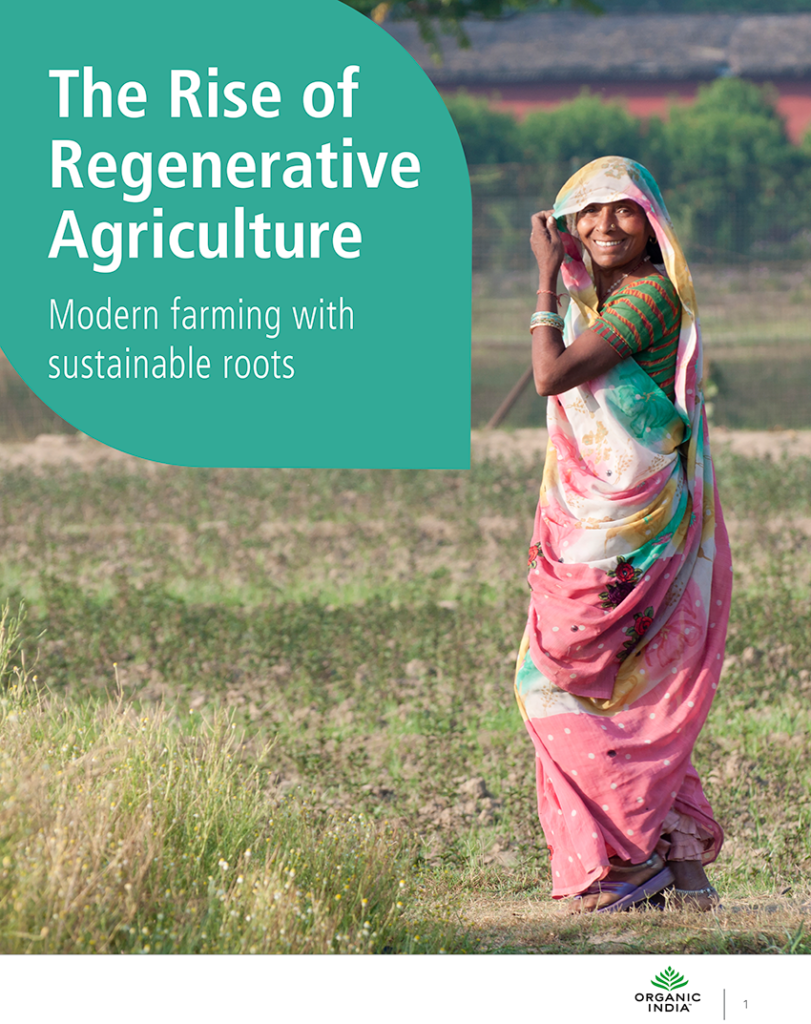One global wellness company is on a quest to prove that Ethical Enterprises not only can exist in the modern world but can thrive.
ORGANIC INDIA co-founder and president Bharat Mitra’s story is as much about vision, purpose and synchronicity, as it is about being in love.
It begins in the city of Lucknow, the heaving capital of India’s most populated state, Uttar Pradesh. Today, close to three million people live in the capital alone, amidst an ever-expanding throng of industry, urban sprawl and artistry. Bustling markets, rich with ceramics, baskets and sequin embroidered cloths spill onto roadsides, competing for space with high-rise buildings, houses, and temples. The city’s dusty roads are frequently jammed with cars, rickshaws, bullock-carts, cows, and pedestrians.

It was in Lucknow in the early nineties that Bharat Mitra first met his guru, Sri H.W.L. Poonjaji, who was affectionately known as ‘Papaji’ by his devotees. “One look into Papaji’s eyes, and my life was changed forever,” says Bharat Mitra, reflecting on that time.
Bharat Mitra remained with Papaji for seven years, in devotion and service, managing the house where all of his public meetings took place. “By His Grace and His Love, I immersed myself completely in service of my beloved Master. During those years, I never saw myself being engaged with the conventional world,” he says.
Yet one day, a little over a year before his passing, Papaji instructed Bharat Mitra to set up a PLC (Private Limited Company). “I simply said ‘Yes Papaji,’ but the truth was I didn’t even know what a PLC was. I had to wait until he left the room to ask someone what it meant,” recalls Bharat Mitra, adding, “One of the gifts of living with Papaji was letting go of the need to ‘know’ anything.” Despite his seeming inexperience, Bharat Mitra began working with a few of his fellow devotees to create a business that would embody Papaji’s teachings of Unity and Interconnectedness. “We saw clearly that the corporate structure did not have to be limited to only pursuing financial profit, but that it could become a vehicle for positive, transformative change in the world.”
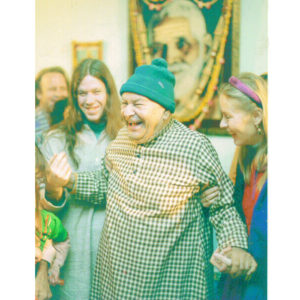
Their cross-cultural backgrounds put them in a particularly interesting position to do so. “As foreigners who had been living in India for many years, we had a unique opportunity to use business as a bridge between cultures, races and religions,” says Bharat Mitra, who now shares his time between India, Israel, the USA, and Australia.
Beginning with the trading of handicrafts and textiles between India and Israel, the team had soon created enough of a financial base to focus on what was closest to their hearts: herbal medicine. Their plan was to export India’s ancient Ayurvedic medicinal wisdom, in the form of herbal formulas and supplements, to the West.
Discovering deeper issues
Yet once Bharat Mitra had witnessed the critical and toxic state of India’s agriculture, as well as the substandard manufacturing practices that were available at the time, he realised that their mission would be far better served if they worked across the supply chain themselves, beginning with the health of the land and farmers, all the way through to the consumer.
“It was demanding, and at times incredibly challenging, to operate such a diverse range of activities,” Bharat Mitra says. “But we were inspired by the unique potential to infuse every stage – from seed to shelf – with values and standards of quality that were simply unavailable otherwise.”
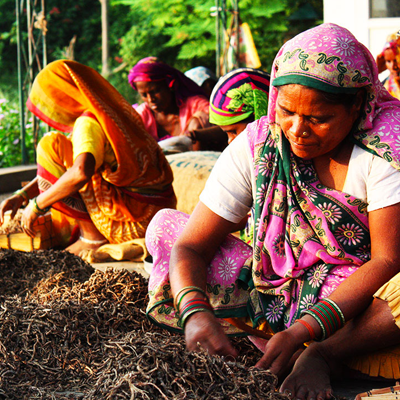
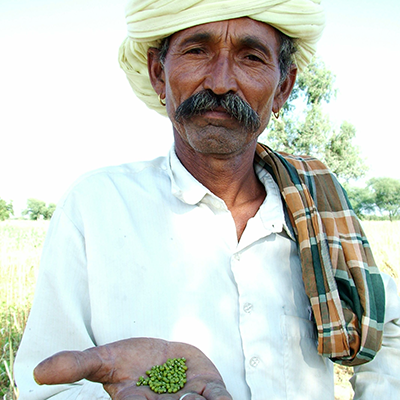
Building a company on values
What Bharat Mitra lacked in business know-how he made up for in passion and drive. His calling was to build a company that would be a vehicle of consciousness in the world, committed to environmental and social justice – but dreams could only carry him so far. Help came from a yoga teacher and fellow devotee of Papaji, Bhavani, who became a co-founder of the fledgling company and helped identify that a solid business plan was needed to take them into the future. Working closely together, they were soon putting all their resources into developing agricultural infrastructure, recruiting farmers, and creating the technology to process their own herbs in a way that retained their healing potential.
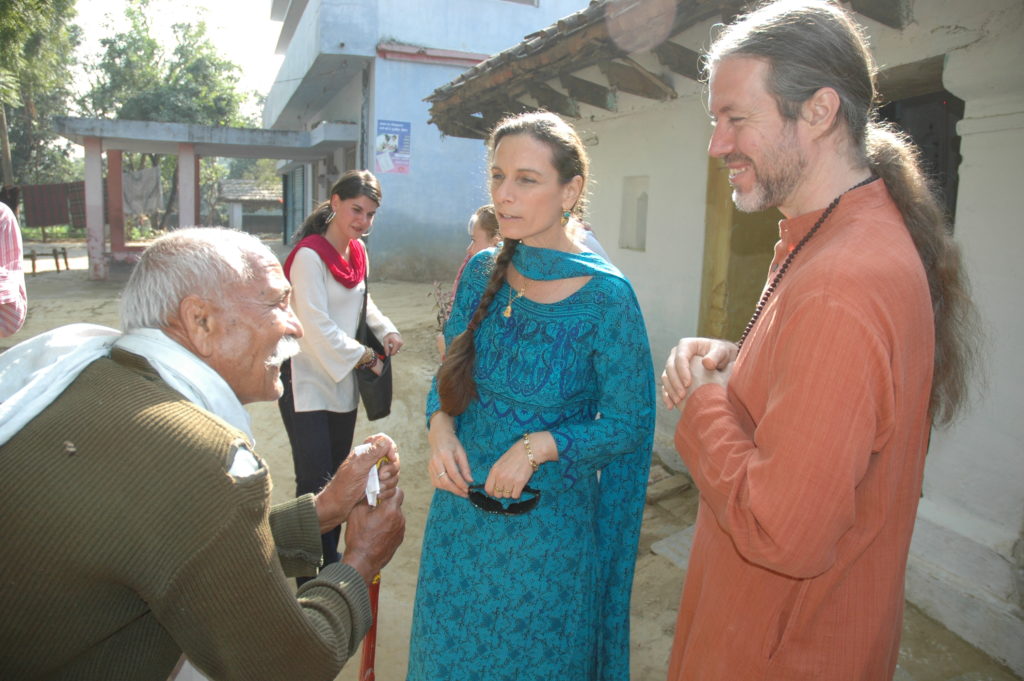
“We were in love with the vision of being able to serve the planet in a sustainable way,” Bharat Mitra told Australian Yoga Life magazine.“Every decision we made was based on looking at the whole operation from a very holistic perspective, and by the end of it, you have a complete ecosystem, with everyone participating and everyone benefitting.”
The many hours spent toiling together over the business led to a deeper connection between Bharat Mitra and Bhavani, and before they knew it, the two of them fell in love. With their shared commitment to build a value-based company, the newly-married couple campaigned tirelessly to convince marginalised farmers who were struggling commercially to try something different: not just organic agriculture, but the organic farming of Tulsi, a sacred herb that had never been grown commercially before.
Getting farmers on board – organically
The first farmer to take the gamble was Kailash Nath Singh from Azamgarh, a district in eastern Uttar Pradesh, whose land had been ravaged by a toxic cocktail of fertilisers and pesticides. With the company’s assistance, Kailash was able to convert his land and grow the inaugural crop of Tulsi for ORGANIC INDIA in his regenerated soil.
Speaking in Business Today to reporter Pallavi Srivastava about the risk he took eighteen years ago on an unknown venture, Kailash said, “I simply had faith in them”. It was faith well founded. The productivity of his farmland increased tenfold and his ORGANIC INDIA crops earned him four times what he was earning previously.
True Wellness for all
Putting people before profits is a fundamental principle of ORGANIC INDIA, and it has reaped enormous benefits for the company, whose net worth is an estimated US $100 million today. Alongside the dedication to empower its employees – as evidenced by its policy to give each employee shares in the company – it also strives to care for the health and wellbeing of the surrounding community.
Currently, the company operates two healthcare centres in its main farming areas, providing free medical care not just to farmers and their families but also to surrounding villages.
The centres run health education programs, prenatal check-ups, baby wellness care and subsidise travelling surgeons to perform cataract operations in order to restore vision to patients.
“We help thousands of people a year through these centres,” says Bharat Mitra. “We are also working to support additional needs within our farming communities, through the provision of water filters, toilets and solar lamps.”
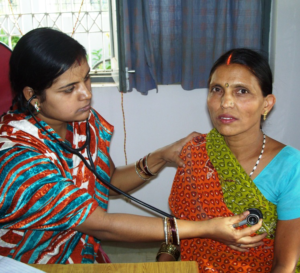
With fields of fragrant herbs, flowering trees and beautifully maintained gardens, life on ORGANIC INDIA’s Brindavan research farm in Lucknow seems like a picture of tranquillity. Mother of four Jjnanavati, 49, who began working there four years ago, says the future of her children has improved dramatically since. “My children are studying now and they are very happy,” says Jjnanavati. “My husband is suffering from a tumour so I am the only bread winner. Since the time I started working here, me and my family live in comfort.”
Stories like these are hearteningly common amongst ORGANIC INDIA’s more than 2000 farmers, and are testament to Bharat Mitra and Bhavani’s unwavering commitment to spearhead a company that operates as a vehicle of consciousness while remaining profitable in the global market.
“My wish for this and future generations is that we will wake up from the illusion of separation from Mother Nature and one another, recognising that each of us is a unique expression of the same Oneness” says Bharat Mitra.
“The very purpose of ORGANIC INDIA is to be an embodiment of this truth; where there is no separation between spirit and matter. People ask, ‘Can spirituality and business co-exist?’ But even the very question suggests that they are contradictory. The real essence of spirituality is that we are spiritual beings living in a physical world and there is a way to live our physical experience fully without disconnecting from who we are. My experience is that nothing is excluded from spirituality, including business.”
Tell us what you think in the comments below. Can Ethical Enterprises exist in todays global market? Are these types of businesses the future of Not-For-Profits in Australia and beyond?
This article originally appeared in Australian Yoga Life Magazine issue 51 under the title, Ethical Enterprises: Can spirituality and business co-exist?
